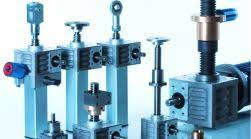Screw jacks, the workhorses of linear motion, rely on two crucial components for efficient operation: gear housings and gears. When it comes to material selection, gear housings often utilize robust materials like cast iron or steel, while gears frequently benefit from the unique properties of bronze. Let’s delve into the reasons behind these material choices.
Gear Housings: Strength and Stability
- Function: The gear housing acts as a protective enclosure for the gears and other internal mechanisms of the screw jack. It safeguards these components from dust, dirt, moisture, and potential impacts during operation.
- Material Selection: Cast iron and steel are popular choices for gear housings due to their exceptional strength, rigidity, and ability to handle substantial loads. These materials can withstand the forces generated by the screw jack mechanism, ensuring proper operation and longevity.
- Additional Considerations: In some applications, aluminum might be used for gear housings when weight reduction is a critical factor. However, aluminum housings may not be suitable for heavy-duty tasks due to potential limitations in strength.
Bronze Gears: Durability and Smooth Operation

- Function: Gears are responsible for transmitting rotary motion from the motor or crank handle to the screw, ultimately converting it into linear lifting or pushing force.
- Material Selection: Bronze, particularly aluminum bronze or manganese bronze, is a popular choice for screw jack gears due to its unique blend of properties:
- Durability: Bronze offers excellent wear resistance, allowing the gears to withstand friction and maintain smooth operation for extended periods.
- Low Friction: Compared to steel gears, bronze exhibits lower friction coefficients. This reduces energy losses within the system and contributes to smoother, more efficient operation.
- Self-Lubricating Properties: Some bronze alloys possess self-lubricating properties, minimizing the need for frequent lubrication and maintenance.
Alternatives to Consider:
- Gear Housings: While cast iron and steel are dominant, some lighter-duty screw jacks might utilize engineering plastics for the gear housing to reduce weight.
- Gears: In cost-sensitive applications, steel gears might be used. However, they require more frequent lubrication due to higher friction compared to bronze gears.
Conclusion:
The selection of gear housings and gears plays a vital role in the performance and lifespan of a screw jack. By understanding the strengths of cast iron/steel housings and the advantages of bronze gears, you can ensure a reliable and efficient linear motion solution for your specific needs.
For more information on screw jack design and material selection, you can visit MechJacks https://mechjacks.com/en/ MechJacks is a leading manufacturer of high-quality screw jacks, offering a wide range of options to suit various industrial applications.

